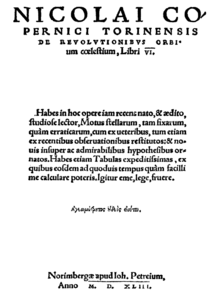
Johann(es) Petreius (Hans Peterlein, Petrejus, Petri; c. 1497, in Langendorf near Bad Kissingen – 18 March 1550, in Nuremberg) was a German printer in Nuremberg.
Life
He studied at the University of Basel, receiving the Master of Arts in 1517. Two years later, he worked as a proofreader for his relative Adam Petri. He became a citizen of Nuremberg in 1523, where he began working as a printer by at least 1524, though his name is only officially entered into the records in 1526. After his death the company was run by Gabriel Hayn.[1]
Work
About 800 publications by him are known, including works in theology, science, law and the classics. He also printed music, using Pierre Attaingnant's single-impression technique. Though the amount of music was small, it was distinguished by its high quality.[1]

His most famous work is the original edition of Nicolaus Copernicus's De Revolutionibus Orbium Coelestium in 1543, after an initiative of Georg Joachim Rheticus and Tiedemann Giese.
The inclusion of a foreword anonymously written by the Lutheran philosopher Andreas Osiander, stating that the whole work is only a simple hypothesis and intended to facilitate computation, which contradicts the content of Copernicus' work, is a rather controversial feature of the edition by Petreius. Petreius had sent a copy to Hieronymus Schreiber, an astronomer from Nuremberg who died in 1547 in Paris, but left a note in the book about the authorship of Osiander. Via Michael Mästlin, the book came to Johannes Kepler, who uncovered Osiander's deed.[2][3]
Bibliography
- Georg Rithaymer: De orbis terrarum situa compendium. Johann Petreius, Nürnberg, 1538 [1][permanent dead link]
- Michael Stifel, Arithmetica Integra. Johann Petreius, Nürnberg, 1544
- Nicolaus Copernicus, De Revolutionibus Orbium Coelestium, Libri VI, Nuremberg, Johann Petreius, 1543 [2]
- Girolamo Cardano, Artis Magnae sive de Regulis Algebraicis Liber I, Nuremberg, Johann Petreius, 1545
- Girolamo Cardano, De subtilitate rerum. Libri XXI. Nuremberg, Johann Petreius, 1550
Notes
- ^ a b Göllner, Marie Louise (2001). "Johann Petreius". In Sadie, Stanley; Tyrrell, John (eds.). The New Grove Dictionary of Music and Musicians (2nd ed.). London: Macmillan Publishers. ISBN 978-1-56159-239-5.
- ^ Edward Rosen: Three Copernican Treatises: The Commentariolus of Copernicus, The Letter Against Werner, The Narratio Prima of Rheticus, Courier Dover Publications, 2004 ISBN 0-486-43605-5, p. 24
- ^ Arthur Koestler: The Sleepwalkers p. 169
External links
- Pallmann (1887), "Johannes Petreius", Allgemeine Deutsche Biographie (in German), vol. 25, Leipzig: Duncker & Humblot, pp. 518–519
- Petreius' ornaments A-F
- https://web.archive.org/web/20060526023248/http://www.nzz.ch/2005/08/06/li/articleCZUON.html
- https://web.archive.org/web/20081023135412/http://www.ta-dip.de/56,0,petrejus-johannes-,index,0.html
- https://web.archive.org/web/20050212034755/http://langendorf.net/buch.htm
From the Lessing J. Rosenwald Collection at the Library of Congress
- Bible. N.T. Epistles. Italian. 1495. Epistole [et] Euangelii [et] Lectioni vulgari in lingua toschana. Florence, Lorenzo Morgiani and Johannes Petri, for Piero Pacini, 27 July 1495.
- Storia di Ottinello e Giulia.Storia di Ottinello e Giulia. [Florence, Lorenzo Morgiani and Johannes Petri, ca. 1500]
